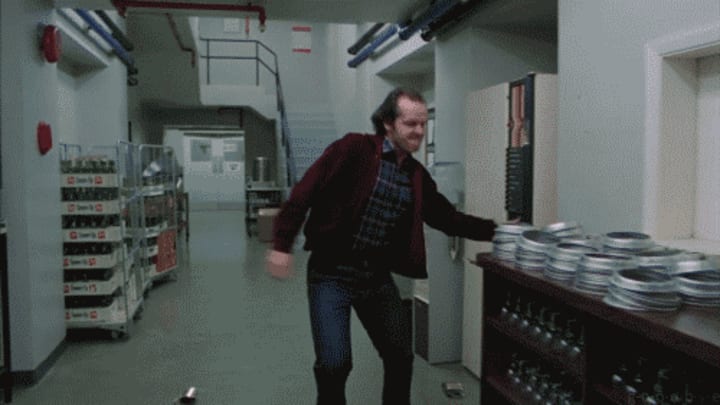10 Things You Shouldn't Say to Someone with A Chronic Illness
Think before you speak.

I have a chronic illness called dysautonomia. As a healthy-looking young adult female, it was quite a bit of a journey to get that diagnosis. As I was on my way to my diagnosis, and now that I have it, I noticed some common responses from people I know regarding my situation. Whether it genuinely comes from a good place or not, many times these have left a bad taste in my mouth without them being aware of it. Having a chronic illness and dealing with a body that doesn't function conveniently is a struggle on its own, and having these unintentionally hurtful sayings cross our minds only adds to the stress load that already exists upon our aching shoulders. So, lo and behold, here are ten things you shouldn't say to someone with a chronic illness.
1. "It could always be worse."

Yes, it could. It could always be better, too. I feel like this saying is used for almost any bad situation and not necessarily just for those with a chronic illness. I cannot recall a time where this did not get on my nerves. This saying invalidates your worries. It gives the impression that, because some other person has a worse situation, I do not have the ability to express any sort of disapproval with my newfound medical situation. Of course, I sympathize with whoever may have a worse diagnosis or situation than me, and I am truly thankful to not be in that state. However, I still have a diagnosis. I still am in a worrisome situation of my own, and, by that logic, I'm in a worse situation than somebody else. So aren't I allowed to feel any sort of frustration? Our bodies are already physically limited because of our diagnosis, so don't try to emotionally limit us as well.
2. "I wish I could stay home and not go to work/school like you."

This one stems from just plain ignorance. I may be homebound and technically home all day, every day, but it's not what it sounds like. I don't sit by the pool with a cocktail in my hand while sunbathing. I don't get to play video games and watch TV ordering Pizza Hut. In reality, I am in bed because I physically don't feel well enough to get and/or be able to stand up too long. I am resting, waiting for my heart rate to go down and my strength to go back up. I am home, confined to the walls of my room all day because I have to avoid the sun and hot weather because of my bothersome heat intolerance. You may wish to be in my position, but once you know the real story, you shouldn't want to at all. I'd gladly trade places with anyone who says this to me. I very much miss being able to go out every day and work/go to school, but now I have to limit that severely to account for a little amount of energy. Home is where you feel most comfortable, but, when my body causes me to be STUCK here, I feel far from it.
3. "[Insert celebrity name] has your condition, and they are still up and working!"

Yes, I know Selena Gomez has lupus. I know that Lady Gaga has fibromyalgia, Tom Hanks has diabetes, and Daisy Ridley has endometriosis. It's great that they have continued having thriving careers, can still perform, and be the illness warriors that they are. However, the weird thing about having a chronic illness is that despite the fact that we have the exact same label on our medical records our conditions are not exactly the same, and that goes for anyone with an illness. Oddly enough, this is something I have a bad habit of telling myself. As someone with dysautonomia, Solange Knowles is that celebrity for me. Ever since she announced her diagnosis, I have been looking up to her as a role model, taking whatever performance or appearance she does and using it as a way to compare myself to her and all she is doing. But it is that very comparison that is harmful to someone with a chronic illness, whether that comparison is coming from another person or the person with the illness themself. We all go through different experiences in our conditions. We have different symptoms that affect us in different severities, so it is illogical to compare another person's illness with your own because one's condition is completely different, the access to medication and healthcare is different, and one's treatment process is different.
4. "Try cutting [gluten, dairy, sugar, etc.] out of your diet or using this alternative medicine. I did, and I'm doing great!"

Our bodies are different. We all come in different shapes and sizes, and along with that, our immune systems are completely different. Therefore, it is often quite a learning process in trying out what methods of treatment help your specific case. Some can tolerate a medication while some cannot. Some benefit from cutting out specific parts of their diets or incorporating something while others do not have any benefit. As much as there is a journey in getting a diagnosis, there is a journey afterward that takes time and trial to see what makes us feel best. When you force someone to try a specific diet or method, it might make them feel a little uneasy. Either we have already tried it or we cannot make the change right now to make an accurate conclusion. Trust us on this one, we're trying everything we can. Thanks for the advice, though.
5. "You'll probably grow out of this; it'll be fine."

This statement is a bit less common than most of the ones here. You'll mostly hear this if you're a minor. However, now, in my 20s, I still hear this occasionally. I wasn't diagnosed when I was a teen, and by now, I am practically certain that my 5'9'' body is done growing. While it is true that there is a chance that this diagnosis could be grown out of, that trend is directed towards those that are still in developing years. Some adolescents who are diagnosed with my condition, along with other conditions, have a chance of growing out of their cases, but not all of them do. To say that one might grow out of their condition is very dependent on their age and individual case, and, at a point, it becomes simply wishful thinking. While it is a good idea to keep a positive mind with a diagnosis, it is also important to keep a more realistic mind as well.
6."Everyone has their own medical issues; no one's body is 100 percent."

This reply coincides with statement #1. This is a quote I would often hear when I was working up to my diagnosis. I was constantly having to research and advocate for myself because doctors would slap an "anxiety" label on my symptoms and call it a day. It was, from that point, pretty much my own fight to find out what was going on with my body. In this constant concern and search, I appeared like the classic hypochondriac. I heard this a lot as a way of trying to make me stop obsessing over my body and trying to figure out what was going on. This statement does have some validity toward it. Doctors predict around 1 billion people have a vitamin deficiency. Not many people speak about their health troubles, and you never know someone's struggles until they tell you. However, not everyone has symptoms that debilitate them or interrupt their daily lives. So, everyone has their own medical issues, but not everyone's problems play a huge factor daily.
7. "It's all just anxiety. I've been through hard times, too. The mind is a powerful thing."

I mentioned in the previous statement that being told about anxiety being the sole reason for my problems was something I personally heard a lot in my diagnosis journey. This is common for a lot of young people who are approaching a diagnosis. We know our own bodies better than anyone else. We know how we normally feel, and we know if something is wrong. The mind really is a powerful body part, and anxiety CAN cause real physical symptoms. Anxiety attacks can cause us to lose our breath, have headaches, and more. But I know when something is wrong with me even when doctors say there isn't anything going on. Figuring out what is going on with your body is already tough when the doctors who are supposed to be doing this job for you are not giving you the answer you need, but when people are constantly shoving the whole anxiety notion down your throat, it makes you feel like you are going crazy. You know that there is something wrong with your body, but you can't put a label on it. It's so stressful to figure out what is happening to your body on your own. To be told that it is all in your head, that it is all due to worrying too much, or that it is anxious thoughts makes the daunting journey even worse.
8." You don't look sick though!"

If you speak to anyone with a chronic illness, chances are they're going to have a love/hate relationship with this saying. Of course, nobody wants to look sick. The intentions of saying this are definitely coming from a good place. However, it can cause a little bit of a bad taste in those that are ill. Just because we don't look like an extra from The Walking Dead does not mean we are not sick. We have a lot of naysayers already who try to invalidate and doubt our struggle using a lot of the same things as above and more. Mentioning the fact that we do not look the way we feel becomes an addition to that invalidation.
9." You were able to do this/go out today, so it must not be THAT bad!"

You're wrong. It actually is bad. Just as our bodies are different from each other, our days can differ as well. My symptoms fluctuate in severity all the time. Some days I do not have the energy to even get up and make myself a decent meal, sometimes my heartbeat at rest can be as high as a person who just ran a marathon, and other days I can feel almost completely normal. It is hard to tell when what kind of day will happen, so I constantly have to wing it with my plans. If I feel well enough to go out and do something, best believe I'm going to take full advantage of that. When you see me out doing things, you're seeing a good day. What you may not know is that I have to rest up sometimes to have that opportunity. Many times after I go out for a day, I have to spend the next days after resting to gain my energy back. So it's not THAT bad now, but, for much of the time, it is.
10."Come on. I know you can do more than that."

No. No. NO. Never tell this to anyone with a condition, illness, disease, etc. What you "know" about what they're going through, what they can do, and how much they can do. YOU don't forget to put that hold on them. Not even someone with the same condition can say that to another person. You don't understand someone's condition fully, and you never really can unless you are them themselves. If a chronic illness sufferer tells you that they do not feel well enough to do something or to go somewhere, THEN THEY DO NOT FEEL WELL ENOUGH. Nobody wants to feel like a hobbit, like they're too sick to do anything, or like they are helpless and can't go out and live their lives. Trust me when I say not one chronic illness patient would lie about this. You haven't had to go through what they've gone through, so don't tell them how they feel. The symptoms are obvious enough for us as it is.
...
There are easily quite a few other responses that can be listed here as well. These 10 things can extend to 15, 20, even 30. But having a diagnosis is a lot to take in, and so is learning how to deal with one. If you have a loved one, a friend, a colleague, or anyone you come in contact with that has a chronic illness, be sure to keep this information in mind and think before you speak. Words can hurt those who are already hurting.
If you have already said these things to someone with a chronic illness without knowing its effects, do not take this as a time to feel bad or guilty. People around those with a chronic illness have just as much learning to do as a person who has it themselves. Use this advice towards the ones you know with a chronic illness. Instead of saying these ten distressing statements, simply support, love, and be considerate to the ones around you who are dealing with this.
About the Creator
Jessica Almaraz
An actress from LA with a chronic illness and a love for astrology.






Comments
There are no comments for this story
Be the first to respond and start the conversation.